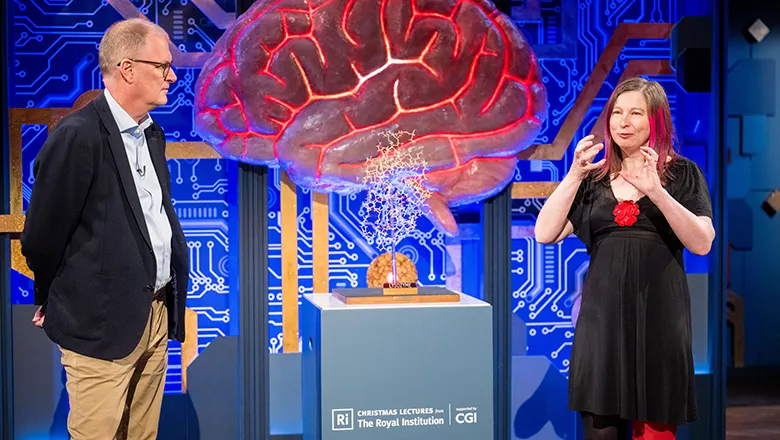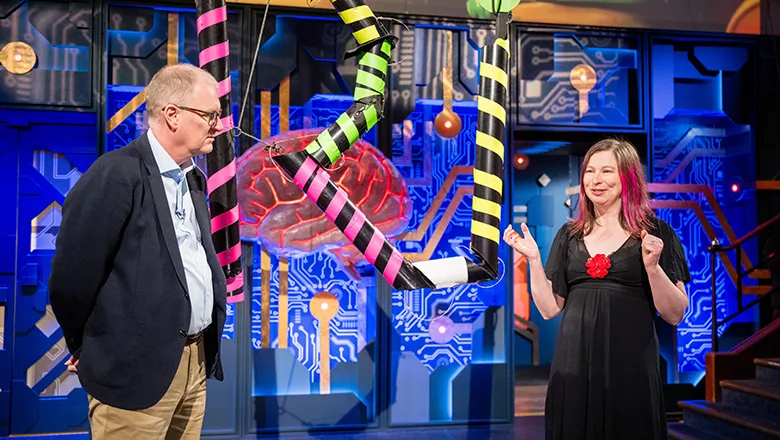These opportunities are also a vital chance to encourage more diversity in the next generation of scientists. The problems we now face as a society are global in scope, and to solve them in ways that benefit everybody, you need to ensure that a wide variety of voices are part of the solution."
Professor Rivka Isaacson
28 December 2023
King's Chemist joins science greats in prestigious Royal Institution Christmas Lecture
Professor Rivka Isaacson helped reveal the truth about Artificial Intelligence in a three-part special series on BBC 4.

In a televised appearance on BBC 4, Professor Rivka Isaacson appeared alongside experts across academia and leading AI companies as part of the Royal Institution’s annual Christmas lectures.
The Christmas Lectures are the flagship outreach programme of the Royal Institution, one of the UK’s oldest organisations for scientific education and research. First held in 1825 and initiated by Michael Faraday, these were established to present scientific subjects to a general audience in an engaging way, with previous notable Christmas lecturers including the astronomer Carl Sagan, the biologist Richard Dawkins and Sir David Attenborough. They have been broadcast almost continually since 1936 and it is the world's longest running science television programme.
In this year’s lecture series on the topic artificial intelligence (AI), Professor Isaacson helped unravel the myths behind the headlines and explore how the technology might shape our lives alongside host Professor Mike Wooldridge, Director for AI at The Alan Turing Institute.
With help from a robotic model, Rivka explained the importance of proteins in the body and how AI is currently revolutionising both their study, and the development of medical treatments. Proteins are naturally occurring strings of amino acids that are present in all living organisms and perform vital functions within the body, with examples like antibodies helping to fight off disease. A protein’s ability to correctly do its job is dependent on the shape their amino acids are folded into and improper folding of proteins can lead to disease, such as Parkinson’s.

AI is playing an increasing role in research aimed at expanding our knowledge of protein shapes and structures, and by extension, how to create effective treatments that can restore proper protein function. Alphafold, an AI system developed by Google DeepMind, can usually predict the three-dimensional shape of a protein based on the sequence of its amino acids with a high degree of accuracy. By exploring the impact that systems like Alphafold could have on future drug development, Rivka and Mike shone a light on the multi-faceted impact that AI is having on the world today.
Commenting on how she felt about the experience, Professor Isaacson said, “It has been a huge honour to be invited to the Royal Institution’s Christmas Lectures and I’ve had great fun doing it, meeting lots of interesting people and seeing behind the scenes of the tech, filming and production that goes into a public outreach event on this scale.
The pandemic made people aware of how much science impacts their everyday lives and helped them understand that scientific concepts don’t have to be and shouldn’t be inaccessible to the public. For scientists like me, events like these are valuable two-way process and I always get questions which help me think in new ways."
Professor Rivka Isaacson
“One of my favourite things is talking about science with non-scientific audiences. One of the few good things about the pandemic was that it has made people more aware of how science impacts their everyday lives and helped them understand that scientific concepts don’t have to be and shouldn’t be inaccessible to the public. For scientists like me, it’s also a valuable two-way process and I always get questions which help me think in new ways.
“These opportunities are also a vital chance to encourage more diversity in the next generation of scientists. The problems we now face as a society are global in scope, and to solve them in ways that benefit everybody, you need to ensure that a wide variety of voices are part of the solution. Welcoming people into science is only the first hurdle in solving diversity and research culture problems, but it is a start.”
King’s also featured in the December 26 lecture, with neurons that were used as part of an onstage demonstration to explain how AI works having been cultivated at the Denmark Hill campus.
December 28 will be the last day of 2023’s Christmas Lecture. Tune in to BBC 4 at 8pm to catch the broadcast or see all three lectures on BBC iPlayer.

